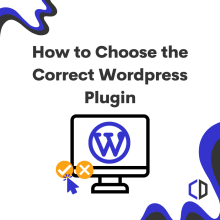
What Are Wordpress Plugins?
WordPress plugins are powerful tools that can extend the functionality of your website, transforming it from a basic blog into a fully-fledged online store, a portfolio, or a membership site. The challenge, however, lies in choosing the right plugin from over 60,000+ options available in the WordPress Plugin Directory alone. We designed this guide to assist you in making the best plugin choices for your website.
Understand Your Needs
The first step in choosing the right plugin is understanding your needs. Are you looking to optimize search engine optimization (SEO)? Enhance security? Add contact forms? Or integrate social media? Once you've established your requirements, narrowing the options is more manageable.
Avoid falling into the trap of installing plugins simply because they're popular. We suggest only adding plugins that need to serve a purpose on your site. Adding too many plugins can cause issues, from site performance to site errors.
Research and Discovery
There are several places to find WordPress plugins: the WordPress Plugin Directory, premium plugin stores like CodeCanyon, independent developers' websites, and more. Use these platforms' search and filter options to find plugins that match your requirements. Look at the plugin description to understand what it does and whether it fits your needs.
Evaluating Plugin Quality
Choosing a quality plugin is paramount for your website's performance and security. Here is a checklist to guide you in evaluating the quality of a WordPress plugin:
- Compatibility: Check whether the plugin is compatible with your version of WordPress to avoid technical issues.
- Regular Updates: Developers should be actively maintaining the plugin with regular updates to fix bugs and add new features.
- Ratings and Reviews: Look at the plugin's ratings and read through user reviews. Don't just focus on the number of stars; read both positive and negative reviews for a balanced view.
- Active Installations: A large number of active installations usually indicate that a plugin is reliable and popular among users.
- Support and Documentation: Quality plugins typically have robust documentation and responsive support. Visit the developer's support forum to see how they handle issues and queries.
- Developer Reputation: Consider the reputation of the plugin's developer or the company behind it. If they have a track record of producing quality plugins, it increases the chance that the plugin you're considering is of high quality.
- Security Considerations: Plugins can introduce security vulnerabilities. Check if the plugin has a history of security issues. A good developer will promptly fix vulnerabilities and release updated, secure versions.
Use this checklist to evaluate the quality of potential plugins for your WordPress site. It will help you ensure that the plugin is useful for your site and reliable and safe to use.
Testing the Plugin
Only install a plugin on your live site after testing it first. Use a staging/testing environment to assess the plugin's performance. Check if it affects the speed of your site or if there are any conflicts with your theme or other plugins.
A plugin might seem perfect on paper, but it may not be the best choice if it interferes with your website's performance. If a plugin does cause issues, a Google search of the issue or error can provide helpful information on if the problem has a fix. If you're not finding any information on Google, it's best to look for another plugin or contact a website designer to assist.
Conclusion
Choosing the right WordPress plugin requires careful consideration of your needs, diligent research, quality evaluation, and thorough testing. While the perfect plugin might not exist, taking the time to go through these steps will significantly increase your chances of finding a plugin that is as close to perfect as possible for your website.
